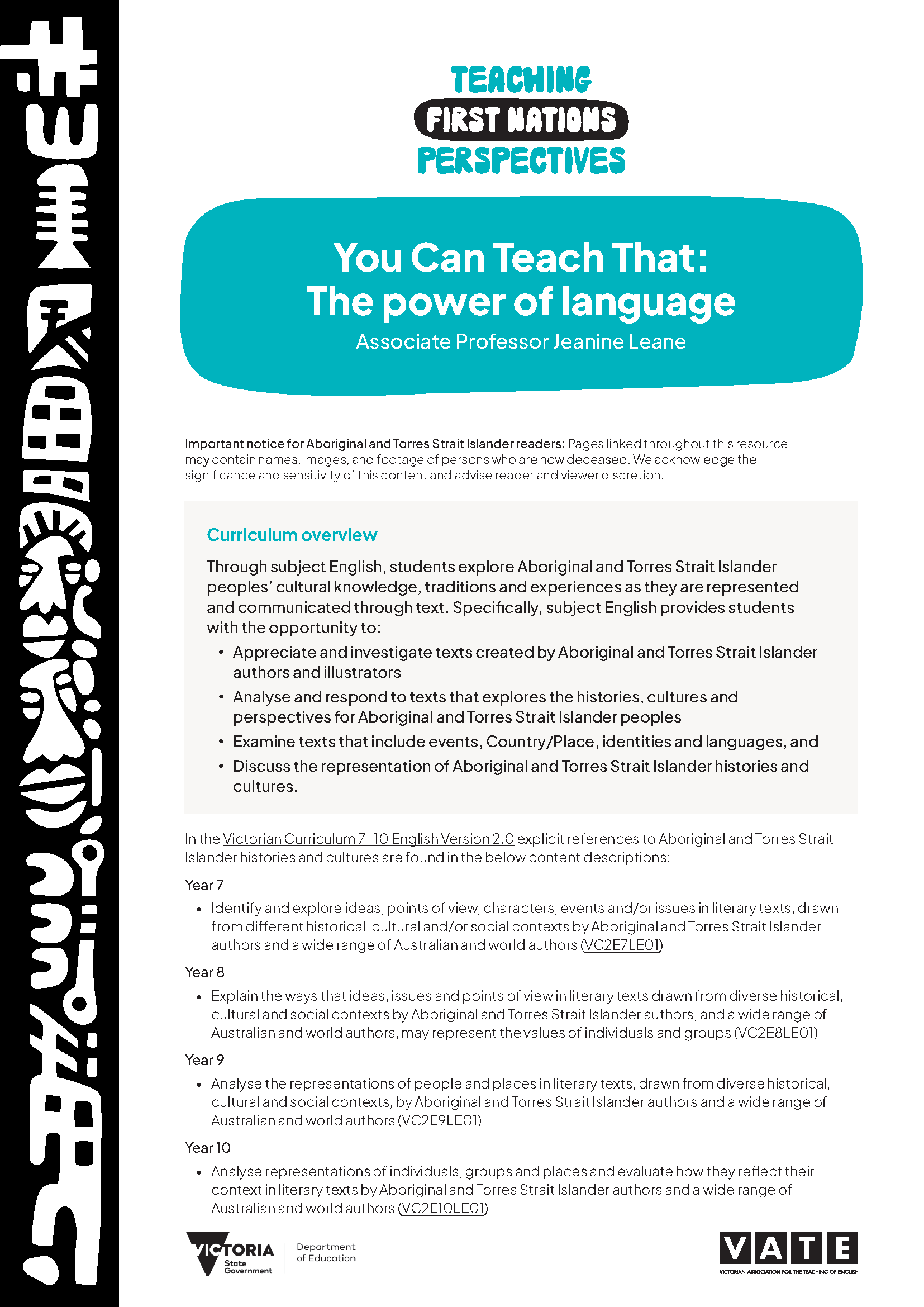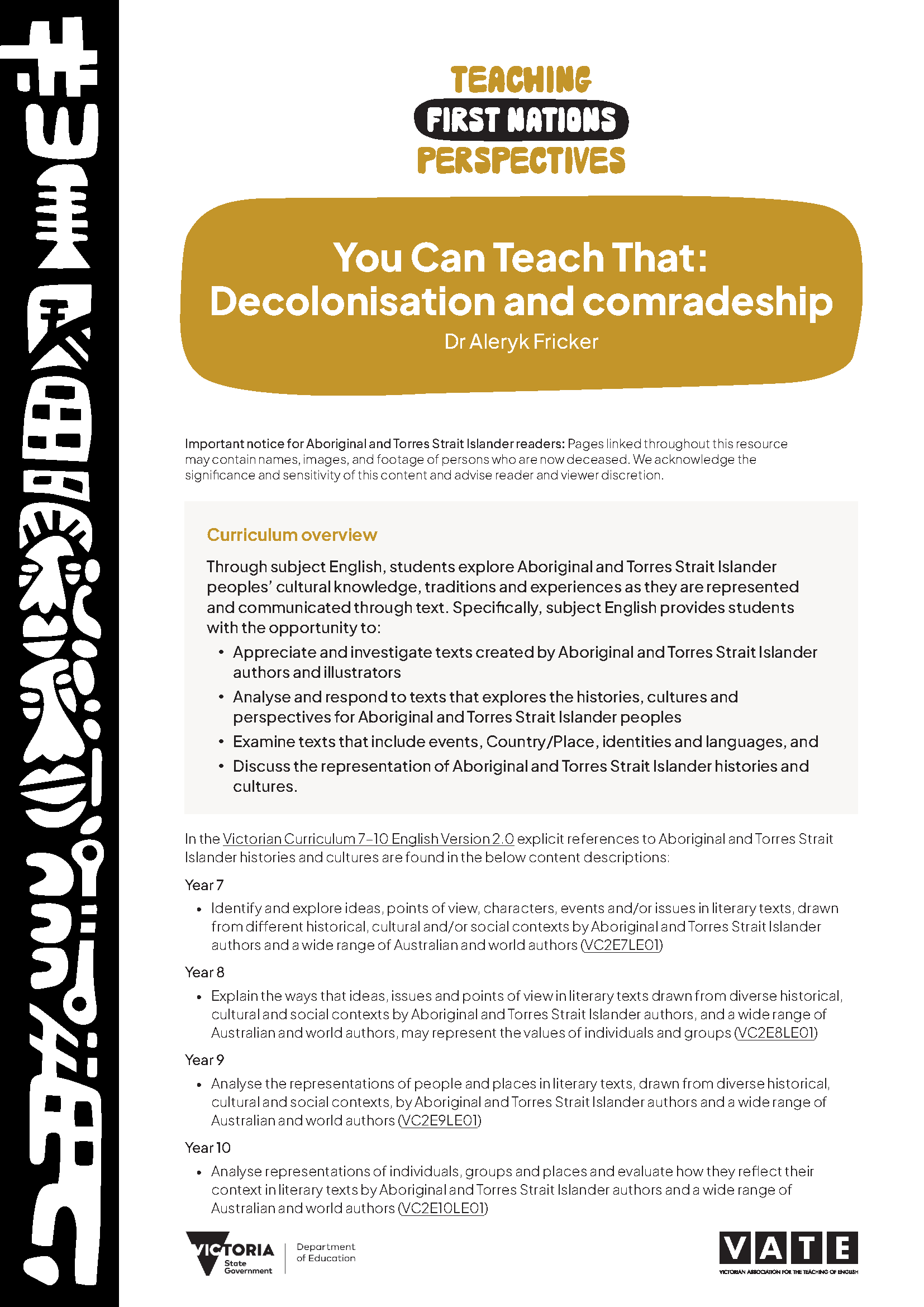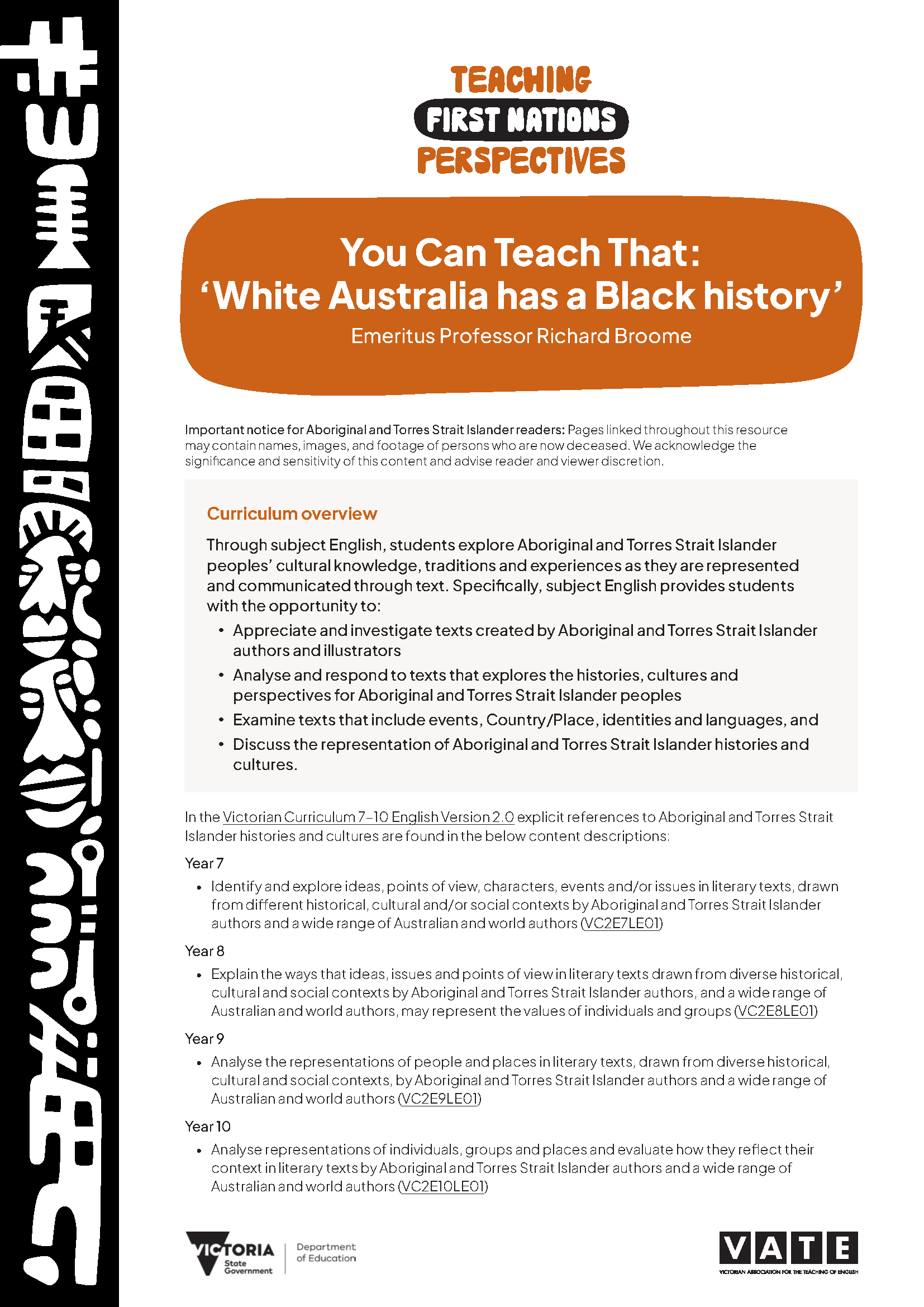
Search VATE
e.g. Tales of Two Cities, VCE literature guide, membership...
You Can Teach That: Teaching First Nations Perspectives
|
VATE's You Can Teach That: Teaching First Nations Perspectives series is designed to support English teachers to build their own Aboriginal and Torres Strait Islander cultural responsiveness in order to provide their students with accurate, informed and culturally appropriate context, knowledge, skills, language and pedagogies. The You Can Teach That: Teaching First Nations Perspectives series consists of a suite of on-demand videos with First Nations academics, commentators, and writers, as well as complementary teaching resources that explore how to use the insights from each in the English classroom. The purpose of these resources is to support, inform and engage English educators in the development of their understanding and teaching of Aboriginal and Torres Strait Islander voices and perspectives in the English classroom. These resources have been written by Emma Jenkins and reviewed by Darby Jones. The artwork for this program has been generously provided by Aretha Brown and has been reproduced with her permission. The music in this program is 'The Red Sand Sea' by Robbie Miller and is used under license by APRA-AMCOS. The You Can Teach That: Teaching First Nations Perspectives program is funded the the Victorian Department of Education's Strategic Partnerships Program. |
| Truth-telling and education - Dr Matthew Keynes | |||
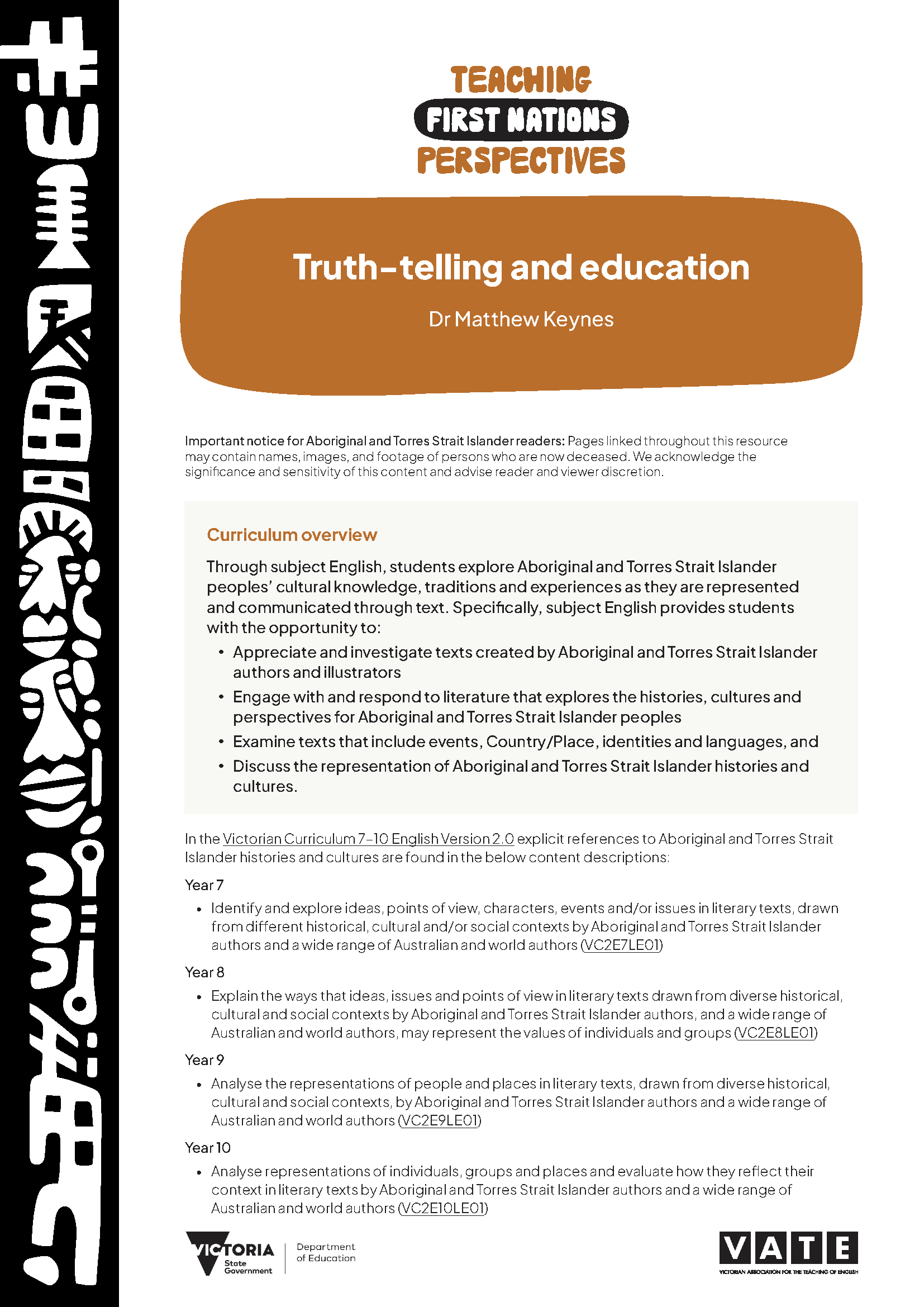 |
Dr Matthew Keynes is a non-Indigenous historian and Senior Research Fellow in the Faculty of Education at The University of Melbourne. Keynes is currently leading an international project on truth commissions, exploring how educators in Australia and the Nordic states are engaging with truth-telling. In this interview for VATE’s You Can Teach That: Teaching First Nations Perspectives series, Keynes discusses the connection between truth-telling commissions, including the Yoorrook Justice Commission, and education. |
||
| Download a copy of the resource here | |||
| Prioritising Blak voices - Dr Tamika Worrell | |||
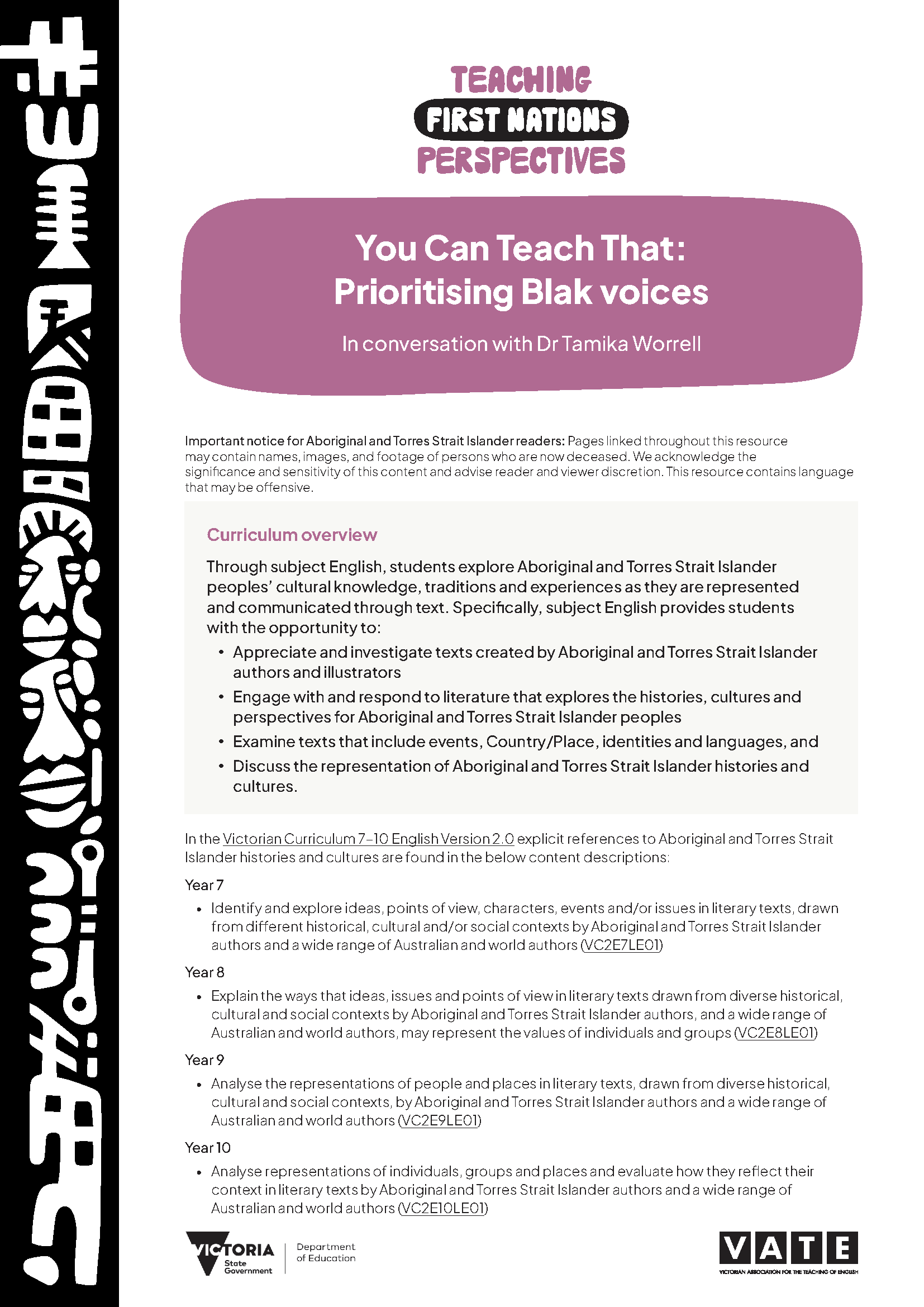 |
Dr Tamika Worrell is Senior Lecturer in Critical Indigenous Studies at Macquarie University. Tamika’s family is from Gamilaroi Country and she has been grown up by Dharug Country, Western Sydney, since birth, where she continues to live and work. In this interview for VATE’s You Can Teach That: Teaching First Nations Perspectives series, Worrell discusses her research into the text selection practices of English teachers who are embedding Aboriginal and Torres Strait Islander perspectives, and her culminating Representational Framework for English teachers |
||
| Download a copy of the resource here | |||
| Creativity and cultural advocacy - Kirli Saunders | |||
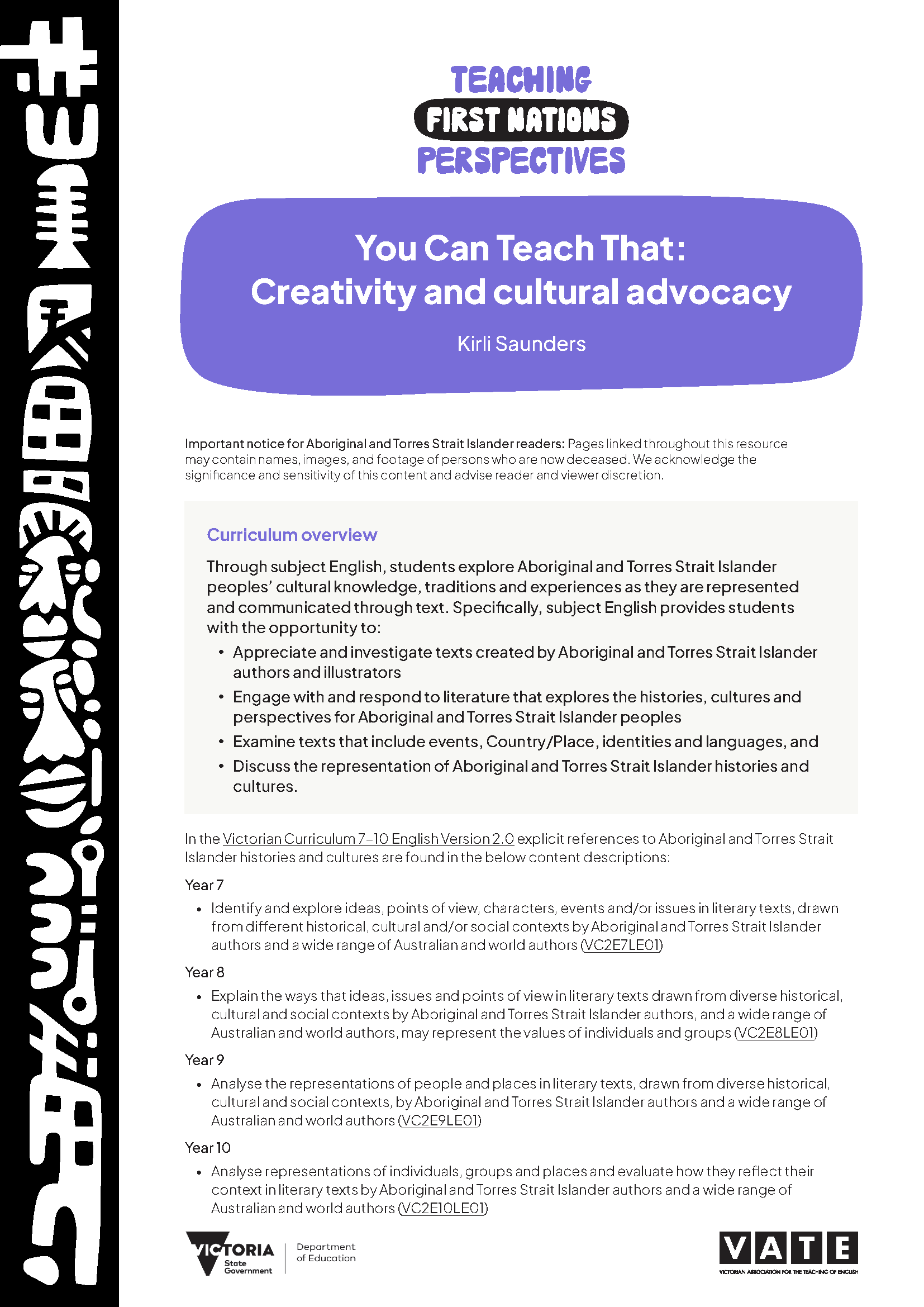 |
Kirli Saunders (OAM) is a proud Gunai woman who rarely stays in her lane. She’s a multi-award-winning multidisciplinary artist, writer, singer-songwriter and consultant. Kirli creates, to connect, to make change, advocating for the land and her communities. She was awarded an Order of Australia Medal for her contribution to the arts (2022). In this interview for VATE’s You Can Teach That: Teaching First Nations Perspectives, Saunders discusses the role of art and creativity in storytelling and the ways in which art intersects with cultural advocacy. |
||
| Download a copy of the resource here | |||
| The distinct voices and identities of Zenadth Kes/the Torres Strait - Samantha Faulkner | |||
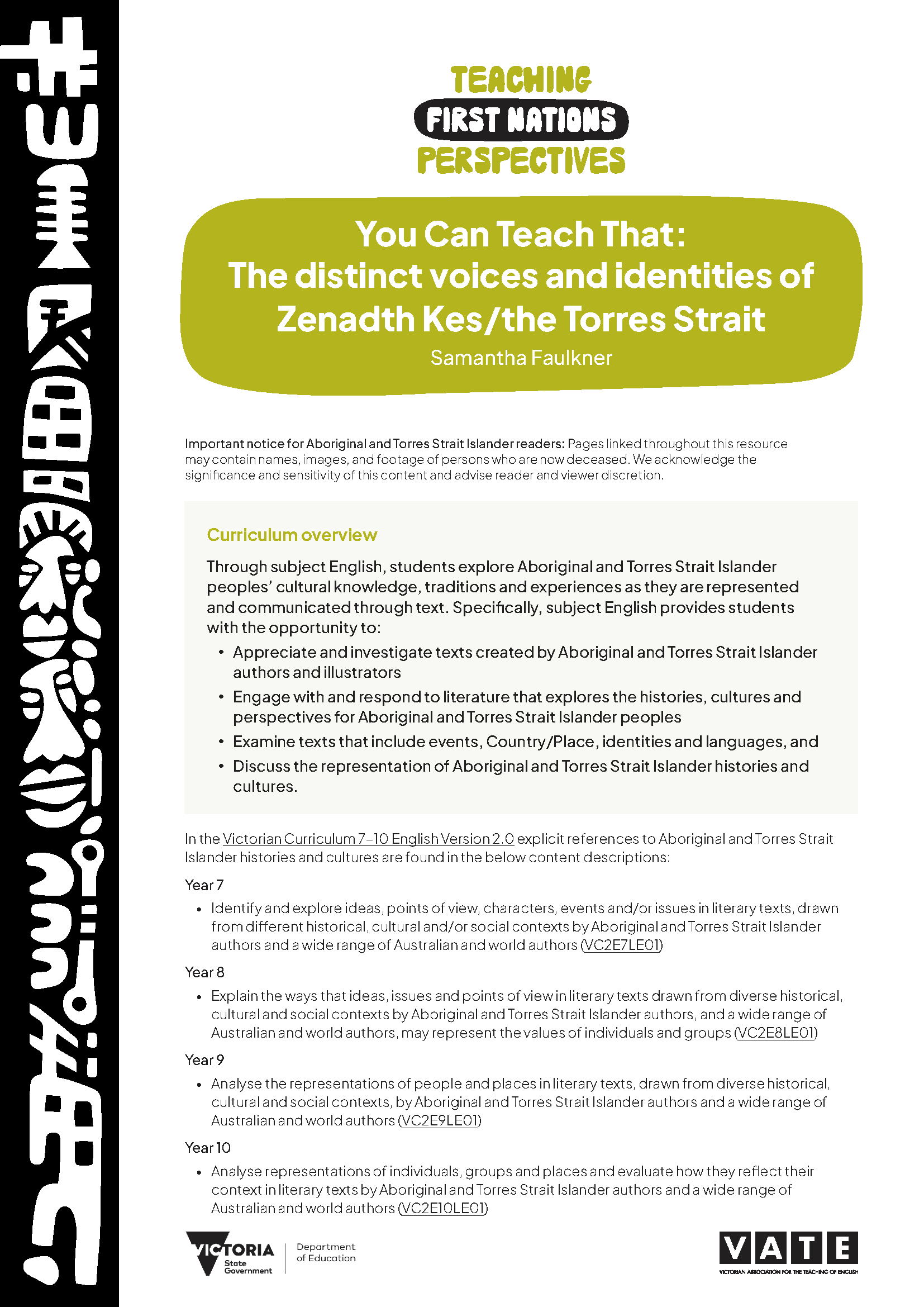 |
Samantha Faulkner is a Torres Strait Islander and Aboriginal woman, from Badu and Moa Islands in the Torres Strait and the Yadhaigana and Wuthathi peoples of Cape York Peninsula, Queensland. Her poetry and short stories have been published nationally and internationally, and she is the proud author of Life Blong Ali Drummond: A Life in the Torres Strait (2007) and editor of Pamle: Torres Strait Islanders in Canberra (2018). In this interview for VATE’s You Can Teach That: Teaching First Nations Perspectives series, Faulkner shares stories from Zenadth Kes (Torres Strait Islands) and explains the unique perspective that Torres Strait Islanders bring to their creative work. |
||
| Download a copy of the resource here | |||
| Writing as a political act - Dr Anita Heiss | |||
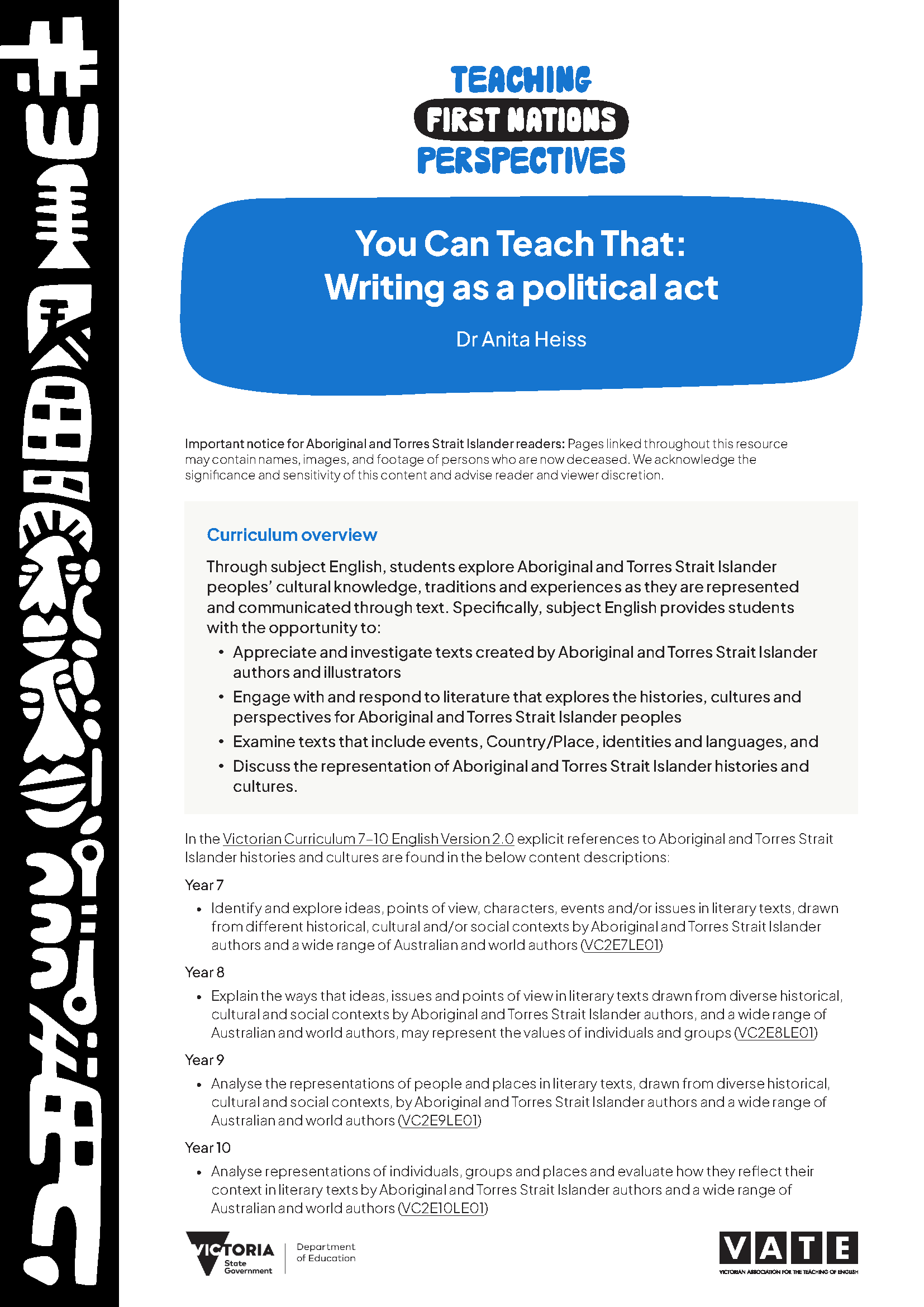 |
Dr Anita Heiss AM (Wiradyuri Nation) is an internationally published, award-winning author of 25 books across genres including Bila Yarrudhanggalangdhuray and Dirrayawadha (Rise Up). Anita is Publisher-At-Large for Bundyi Publishing, an imprint of Simon & Schuster. In this interview for VATE’s You Can Teach That: Teaching First Nations Perspectives series, Heiss explores the notion of writing as an inherently political act, the role of literature in politics and Truth-telling, and the power of representation. |
||
| Download a copy of the resource here | |||
| Reconciliation, Truth-telling and Treaty in Victoria - Uncle Charles Pakana | |||
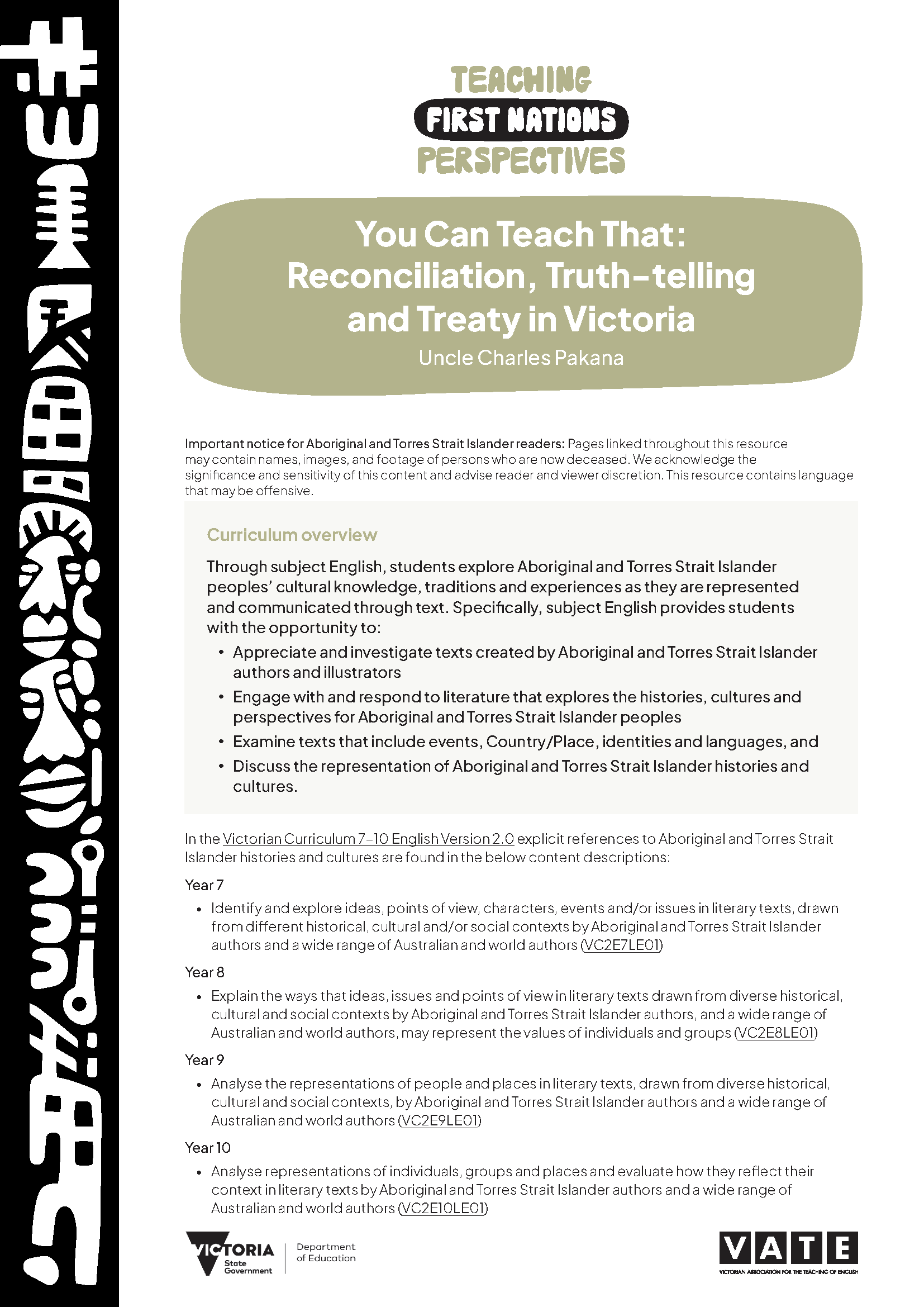 |
Uncle Charles Pakana is a Victorian Aboriginal man of Tasmanian descent. He is the second of three successive generations of Aboriginal journalists and is the founder of Victorian Aboriginal News. In this interview for VATE’s You Can Teach That: Teaching First Nations Perspectives series, Uncle Charles discusses the progress being made toward reconciliation in Australia and shares updates about the Treaty process in Victoria. |
||
| Download a copy of the resource here | |||
| The power of language - Associate Professor Jeanine Leane | |||
|
Associate Professor Jeanine Leane is an acclaimed Wiradjuri writer, poet and academic from southwest New South Wales. Leane teaches Creative Writing and Aboriginal Literature at the University of Melbourne where her research looks at Indigenous storytelling and the archive. In 2023, Leane was the winner of the David Harold Tribe Prize for poetry – Australia’s richest poetry prize. In this interview for VATE’s You Can Teach That: Teaching First Nations Perspectives series, Leane discusses the power of language in shaping identity, subverting societal pressures, and the role of the English language as a tool of colonialism and oppression. |
|||
| Download a copy of the resource here | |||
| Decolonisation and comradeship - Dr Aleryk Fricker | |||
|
Dr Aleryk (Al) Fricker is a proud and sovereign Dja Dja Wurrung academic. He is a former English, History, and Humanities teacher who now teaches and researches Indigenous education and decolonising education practices in Australia. His research recognises that First Nations knowledges and pedagogies have the potential to revolutionise education in Australia and benefit all students regardless of their cultural contexts. In this interview for VATE’s You Can Teach That: Teaching First Nations Perspectives series, Fricker discusses the concept of decolonisation, how teachers can engage with decolonial praxis, and ways in which educators can show up as ‘comrades’ for Aboriginal and Torres Strait Islander peoples in their work. |
|||
| Download a copy of the resource here | |||
| First Nations texts - Professor Tony Birch | |||
|
Professor Tony Birch holds the Boisbouvier Chair in Australian Literature at Melbourne University. In 2017 he was awarded the Patrick White Prize, in recognition of his contribution to Australian literature, and he is the author of four novels, five short fiction collections, and two poetry books. His most recent novel, Women and Children (UQP 2023), was awarded The Age 2024 Fiction Book of the Year. In this interview for VATE’s You Can Teach That: Teaching First Nations Perspectives series, Birch discusses the importance of selecting and teaching texts by Aboriginal and Torres Strait Islander peoples. |
|||
| Download a copy of the resource here | |||
| 'White Australia has a Black history' - Emeritus Professor Richard Broome | |||
|
Emeritus Professor Richard Broome AM of La Trobe University is also President of the Royal Historical Society of Victoria. He is the author of over 20 books including Aboriginal Australians: A History since 1788 (5th edition, 2019) and the award-winning Aboriginal Victorians: A History since 1800 (2nd edition, 2024). In this interview for VATE’s You Can Teach That: Teaching First Nations Perspectives series, Broome gives an account of the history of First Nations people in Victoria, touching on some of the developments in colonial policies, misconceptions about First Nations people in Victoria, and the ways in which Aboriginal and Torres Strait Islander people in Victoria have resisted and survived colonial oppression. |
|||
| Download a copy of the resource here | |||
